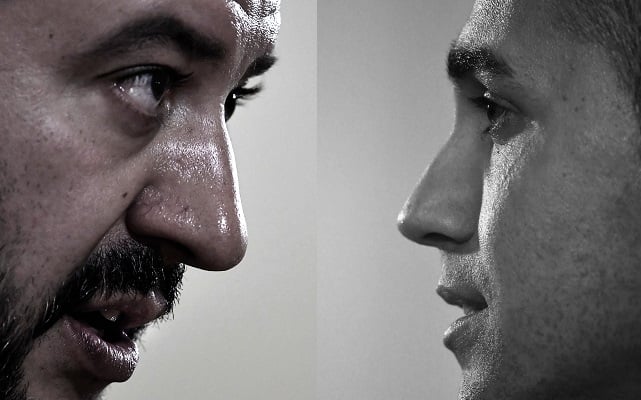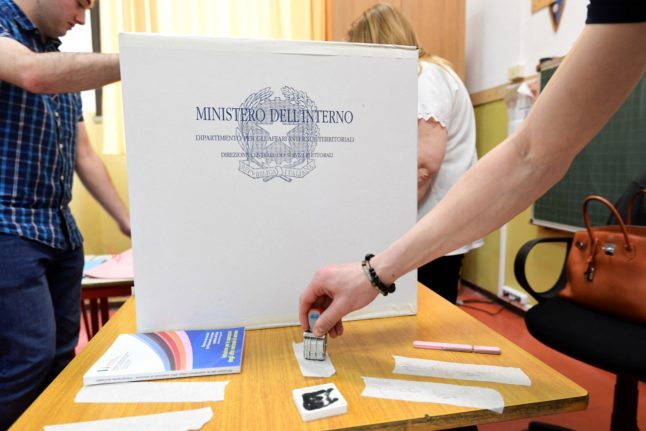Previously bullish Salvini, leader of the far-right League that heads the right-wing coalition which won the most votes in last week's election, told reporters he was the right's prime ministerial candidate but admitted that he “doesn't yearn to be premier at all costs”.
The 45-year-old also refused point blank to work with the ruling Democratic Party (PD), whose centre-left coalition slumped to third on less than 23 percent of the vote and with whom Salvini has frequently battled over immigration.
READ ALSO: Understanding the election result, and what happens next
“We will work in the coming weeks to find a majority, and what I can exclude is that the losers, the PD… could be part of this majority. We will talk about everything else in the next few weeks,” Salvini said.
That dismissal of the PD leaves the anti-establishment Five Star Movement (M5S), the largest single party in Italy after picking up around 33 percent of the vote, as the only possible partner with whom the right could realistically form a government.
Salvini called M5S leader Luigi Di Maio on Wednesday evening, and told press the two had agreed on the need to discuss the Speakers of the two chambers of Italian parliament.
In his account of the call, published on the M5S blog on Thursday, Di Maio said he had told Salvini that the M5S would insist on choosing the speaker of the lower house. That appointment is separate from the formation of a government, he added.
The two leaders acknowledged each other's election success, Di Maio said, but have not scheduled a meeting – for now.
'Don't want chaos'
The League is also the only party with which the M5S can form a majority, as the PD have decided to stay in opposition and have repeatedly called on the M5S and the League to work towards a government of their own.
Di Maio immediately claimed victory in the aftermath of the election despite his party gaining fewer votes than Salvini's coalition. Speaking to the same international media on Tuesday he lamented the lack of proposals to have come the M5S's way from other political parties since the election.
He also said that he would not change his party's manifesto pledges nor accept a different ministerial team from the one he presented before the election.
- Talking to Five Star Movement voters in neglected suburban Naples
- Is Italy's Five Star Movement still 'anti-establishment'?
- What the election result tells us about Italy's north-south divide

Photo: Alberto Pizzoli/AFP
However on Wednesday 31-year-old Di Maio said to business group Confcommercio that he didn't “want to leave the country in chaos,” and that he thought he could help deliver a government quicker than the six months it took Germany to form the grand coalition that was sworn in on Wednesday.
Like Di Maio, Salvini wants any new government to be guided by the promises made during the campaign, which for the right includes a flat tax of 15 percent and the creation of “a less bureaucratic and more federal Italy”.
“I'll do everything that is humanly and democratically possible to respect the mandate given to me by the voters,” Salvini said. “If from this starting point there are other suggestions we're happy to listen to them.”
Russophile
Salvini said that he would not break with his coalition in order to form a government with the M5S, meaning that Di Maio would find himself negotiating with a four-party group that commands more seats than him and contains Silvio Berlusconi, who is hostile to the M5S.
“I opened the door just to kick them out,” Berlusconi said to reporters on Wednesday. That would inevitably lead to compromise over key policy issues and the team of ministers he presented before the election.
Salvini also outlined the Russophile, eurosceptic politics that were once characteristic of the M5S but have been rejected by Di Maio since he took the reigns of the party last year. He said that the euro “was, and is a mistake” and that sanctions against Russia were “a folly”.
READ ALSO:
- These are the promises Italy's political parties made to voters
- Is Italy's League a 'far-right' party?
- Understanding the Northern League

However he said that he would revise relations should “clear proof” emerge of Russia's involvement in the nerve gas poisoning of former spy Sergei Skripal and his daughter Yulia in the English city of Salisbury. Britain says Russia's involvement is “highly likely” and on Wednesday expelled 23 Russian diplomats.
“It's 2018. You can't go around poisoning people,” Salvini said. Salvini also alluded to the M5S's universal income proposal, which would guarantee 780 euros ($960) a month for the country's poorest, as being part of a “cultural difference” between the two political groups.
“We want to cultivate work while — at least by what I read — their proposals are based more on assistance than development,” he said. “But with the PD out of the way, anything is possible.”
By Terry Daley



 Please whitelist us to continue reading.
Please whitelist us to continue reading.